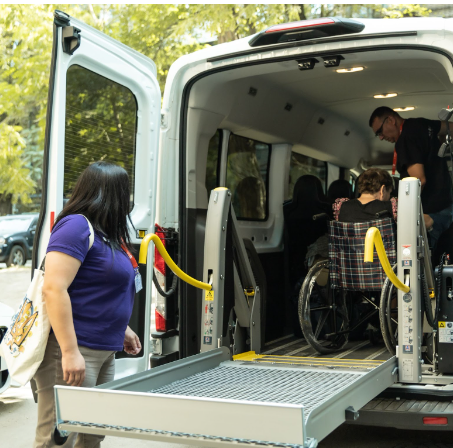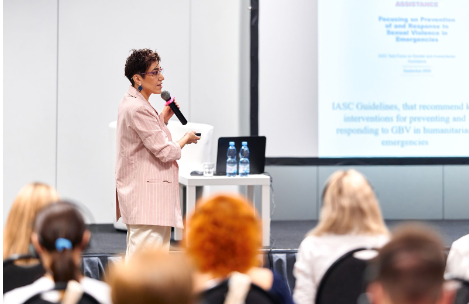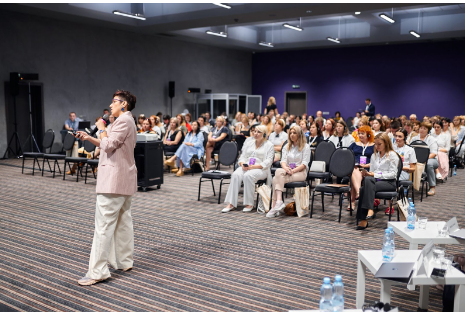As the war continues, case managers provide hope and recovery for survivors of gender-based violence.
Gender-based violence (GBV) remains a significant challenge in Ukraine, especially against the backdrop of prolonged conflict and humanitarian crises. The violence has exacerbated the vulnerability of many individuals, leaving them trapped in abusive situations with limited access to help. GBV case management has become crucial in offering a pathway to safety, support, and recovery for survivors.

A Personalized Approach to Recovery
GBV case management is about understanding each survivor’s unique needs and crafting a personalized plan for their recovery. As Inna Stovbynska, a case manager from Zaporizhzhia, explains, "Each case is considered individually, taking into account the situation in which the person finds themselves. When someone turns to us, we create an individual assistance plan and then move forward together with them." This individualized approach is crucial in ensuring that survivors receive the specific assistance they need to rebuild their lives.
Experiences from the Ground
In Chernihiv, Olena, a survivor of severe psychological and physical abuse, initially hesitated to seek help due to fear of judgment. "I didn't want to expose my problems to others because we lived in a dormitory, and I felt uncomfortable with everyone knowing," she shared. But after reaching out to a GBV case manager, Olena found the support she needed to leave her abusive relationship, protect her children, and start anew. "The specialist helped me restore my psycho-emotional state, create an action plan to get out of the situation, and connect with legal and child protection services," Olena recounted. Her story illustrates the transformative power of dedicated case management.
Another story comes from Vladyslav in the Kyiv region, who endured psychological abuse from his wife. With the help of a case manager, Vladyslav was able to navigate the complex emotions and legal challenges involved in his situation. "Life became unbearable," Vladyslav recalled. "But the case manager listened carefully, provided recommendations, and offered ongoing support." His experience shows how vital these services are in helping survivors regain control and begin the healing process. 
Reaching the Most Vulnerable
Case management is particularly critical for vulnerable populations, such as people with disabilities, who face additional barriers to accessing support. "People with disabilities often suffer from domestic violence, and in such situations, they are more vulnerable because they depend on the help of others," noted Stovbynska. Case managers work to ensure that these individuals receive accessible and inclusive care, highlighting the importance of barrier-free support services.
Building a Network of Support
The United Nations Population Fund (UNFPA) has been instrumental in expanding GBV case management services in Ukraine. In 2023, UNFPA collaborated with local partners to train and deploy over 100 GBV case managers across the country, enhancing the capacity to support survivors in diverse settings. This initiative is part of a broader effort, supported by USAID’s Bureau for Humanitarian Assistance (BHA), to provide emergency lifesaving services for those affected by gender-based violence.


To foster further collaboration and knowledge-sharing, UNFPA recently hosted a two-day conference in Kyiv, gathering GBV professionals, case managers, and implementing partners. The conference featured discussions on best practices, challenges, and innovative solutions in GBV response, emphasizing the importance of emotional support and comprehensive care for survivors.
Moving Forward
As Ukraine faces ongoing challenges, the role of GBV case managers is more crucial than ever. Their work provides long-term support that helps survivors rebuild their lives. "The result that a person achieves by entrusting us with their story is always motivating," reflected Stovbynska. "The most valuable thing is seeing how survivors begin to plan their new future."
With the continued support of USAID’s Bureau for Humanitarian Assistance (BHA), UNFPA is committed to enhancing these vital services and ensuring that all survivors have access to the care and support they need. As we reflect on the recent conference and the progress made, we extend our heartfelt thanks to BHA for their unwavering support. Together, we are building a future where everyone can live free from violence, with dignity and hope.


